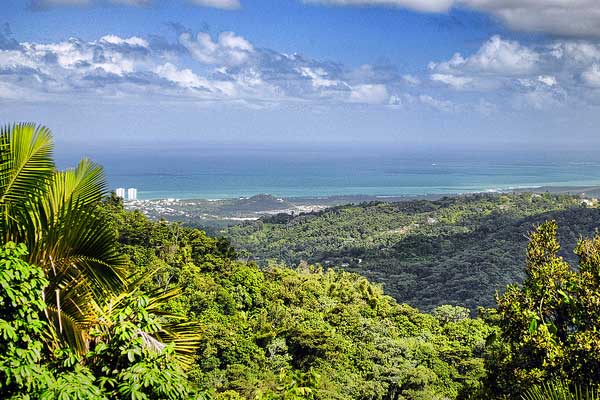
It's not the next Greece but here's why Puerto Rico's debt is making news
Published: July 9, 2015
Just when all the economic news seems to be from Greece, Puerto Rico – the fourth-largest island of the Caribbean and a territory of the United States – has made headlines of its own with a staggering public debt of US $72 billion.
U of T News writer Arthur Kaptainis spoke with Gustavo J. Bobonis, associate professor in the department of economics, holder of a Canada Research Chair and a native of Puerto Rico, about the problems and prospects.
Suddenly Puerto Rico is on the front page. Did you see this coming?
Of course. This is something that has been in the making for a number of years. There has been a structural change in the economy of Puerto Rico. With no strong response by the government, this was bound to happen.
What is the nature of this change?
The main structural change has been a sharp decline in the manufacturing sector over the past 15 years. A crucial policy change has been the elimination of favourable tax treatment of U.S. corporations with operations in Puerto Rico, which had been put in place in the 1950s and 60s. This tax advantage was eliminated in the 1990s by the then-Republican-controlled U.S. Congress. Existing corporations had a grandfathered exemption for ten years, so at the end of 2005 the tax advantages truly disappeared. A second culprit is the offshoring of manufacturing activities following the entry of the U.S. into various multilateral trade agreements. There has also been a reduction in investment by foreign corporations.
So Puerto Rico was forced to borrow?
Let me step back a bit. It’s important to understand the politics behind this. When the federal tax subsidies were eliminated in the 1990s, this was supported by the territorial government at the time, which was controlled by the New Progressive Party, the pro-statehood party. This was seen as a way of saying, “We want Puerto Rican territorial policies and politics to resemble those of a U.S. State.” It was not only the responsibility of the U.S. federal government.
But every government has been accumulating debt in Puerto Rico since the 1970s, following the first oil price shocks. Debt continued to accumulate in the 1990s and 2000s. The territorial government lobbied to create other forms of tax subsidy to help the manufacturing sector. There have been efforts to grow tourism and other services. But we don’t know how successful those efforts have been. There has not been a credible analysis of the effects of these other local subsidies.
 The Puerto Rico economy was originally agrarian. Is there no potential in agriculture?
The Puerto Rico economy was originally agrarian. Is there no potential in agriculture?
Whether agriculture could be profitable is difficult to say. Certain niche sectors would be. Some examples are high-end coffee production, roasting, and distribution, such as the Café Hacienda San Pedro premium coffee brand.
(Image at right: coffee seedlings in Maricao, Puerto Rico/photo by U.S. Fish & Wildlife Service Southeast Region via flickr.)
But coffee is a complicated industry in the P.R. context. One issue not discussed in the media is that there is quite a bit of concentration of market power in the processing and distribution of coffee. Large roasters and distributors have monopsony power over the prices they offer coffee farmers, which might make the industry less profitable than it would be under more competitive circumstances.
Is it true also that electricity is expensive?
Electricity is expensive, partly for geographical reasons. There is no hydroelectricity. Also, electricity is locally generated and distributed by Puerto Rico Electric Power Authority (PREPA), a government-owned monopoly. That system is going to require restructuring to get electricity prices down and make Puerto Rico more competitive.
What about the minimum wage? Some commentators say a U.S.-style minimum wage has hurt the economy.
Remember that manufacturing in Puerto Rico is not based on low-skill jobs, such as those in the textile industry. These were lost in the 1980s, as they were by many industrialized countries. Most manufacturing in Puerto Rico has been capital-intensive and the jobs are high-skilled, particularly in pharmaceuticals, also electronics to a lesser extent. What is required for those industries are high skills and other cheaper inputs such as electricity.
Labour regulations are such that perhaps make Puerto Rico less competitive than other jurisdictions in the Caribbean. There is this issue of the U.S. federal minimum wage, which is binding for a large proportion of the workforce in Puerto Rico. I’m not saying that these should be relaxed, but there are other regulations that seem to make Puerto Rico quite restricted on the labour side.
Are there sectors of the economy that need more emphasis?
Tourism, for sure, is an area that should be receiving more targeted investments. This is all anecdotal, but the type of tourism that has been encouraged is beach-resort and cruise- related. Less so ecotourism, which is an area that could boom dramatically.
What is the best approach to the immediate economic crisis?
The Puerto Rican government has to be very strategic in how to deal with this issue. It requires, to be sure, some kind of debt relief. At the moment it is not feasible to pay the debt. Servicing the debt according to the current terms is going to have extreme negative consequences for the economy.
The question is whether the government is going to go through with reforms that are absolutely necessary to achieve sustained economic growth in the medium to long term to be able to pay that debt. That’s where Washington comes back into the picture. Washington should be thinking of some kind of conditional arrangement for debt relief, combined with technical support, to get Puerto Rico out of the hole. Relief such that the government can spend in the areas in which there might be high returns, so that austerity measures are not absolutely necessary.



